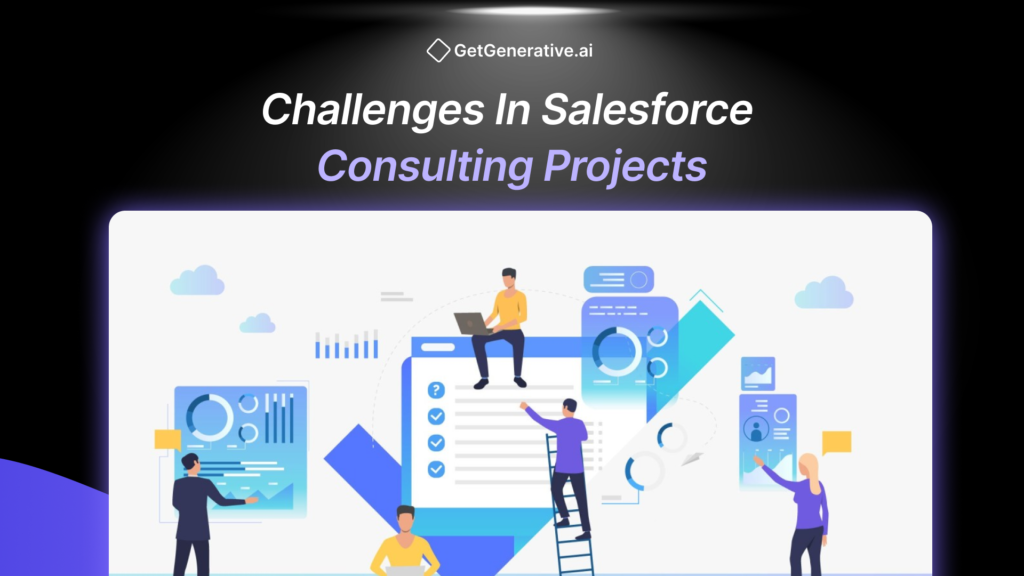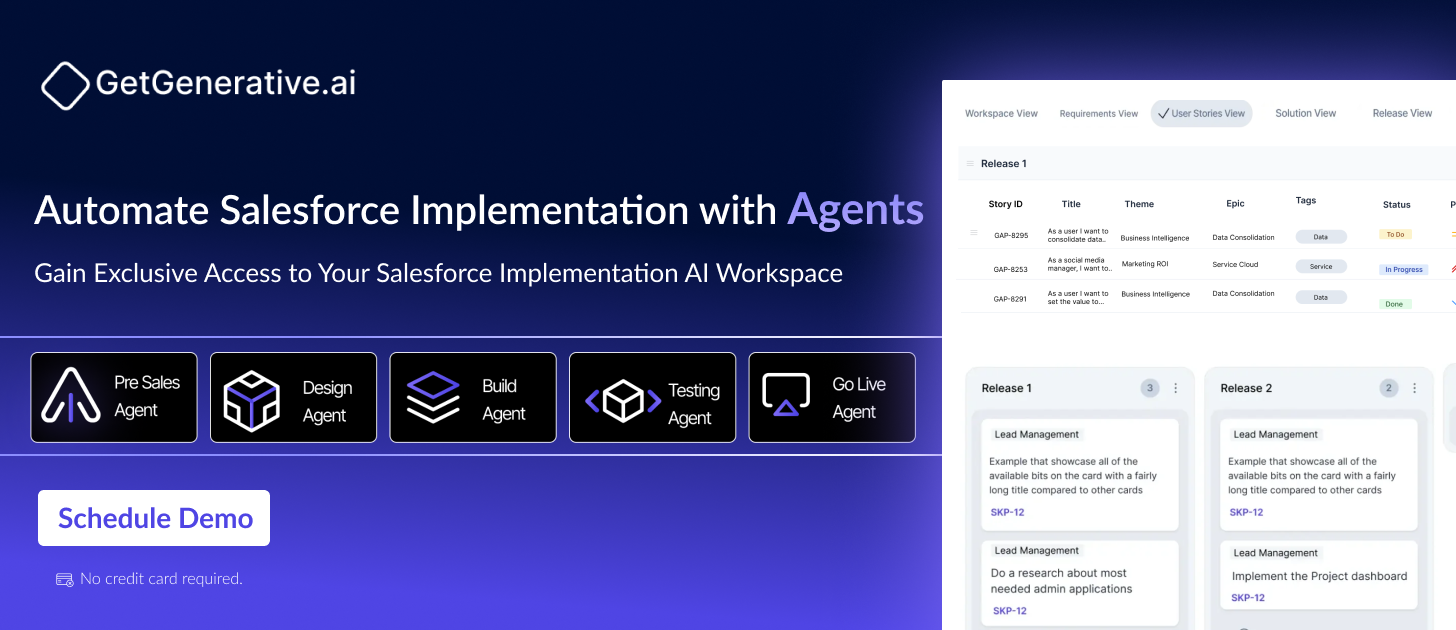Challenges In Salesforce Consulting Projects
In 2025, Salesforce continues to be a dominant force in customer relationship management (CRM), serving over 150,000 customers worldwide. This widespread adoption highlights the platform’s significance in modern business operations. However, implementing Salesforce effectively comes with its own set of challenges.
In this article, we will explore the common challenges faced during Salesforce consulting projects and provide insights on how to overcome them for a smooth, successful implementation.
Challenges Faced in Salesforce Consulting Projects
While Salesforce consultants provide invaluable support, there are several challenges they face when implementing the platform. Let’s explore some of the most common hurdles.
1. Data Migration Complexities
Data migration is often one of the most challenging aspects of Salesforce implementations. Migrating data from legacy systems or other CRM platforms to Salesforce requires meticulous planning to ensure data integrity, security, and accuracy. Any errors or omissions in the migration process can result in data inconsistencies, which can significantly impact business operations.
How to Overcome This Challenge:
Salesforce consultants use a structured approach to data migration, starting with a comprehensive data assessment. They clean, validate, and transform the data before transferring it to Salesforce, ensuring that everything is in the correct format. Consultants also leverage automation tools to expedite the process while minimizing errors, guaranteeing a smooth transition with minimal downtime.
“Understanding no-code or low-code toolsets and effectively communicating problems and solutions, even without coding knowledge, can lead to successful outcomes.”
- Jayesh Govindarajan, Head of AI Engineering at Salesforce
2. User Adoption and Change Management
One of the biggest hurdles in any Salesforce consulting project is user adoption. Many employees resist change, especially when they are asked to switch to a new CRM system. This resistance can be due to unfamiliarity with the new platform, concerns over its complexity, or the disruption of their established workflows.
How to Overcome This Challenge:
To foster user adoption, Salesforce consultants prioritize user engagement from the beginning. They provide role-based training, ensuring that employees are equipped to use Salesforce effectively in their daily tasks. Consultants also highlight the platform’s user-friendly interface and time-saving features, demonstrating how Salesforce can make their jobs easier. Ongoing support and a clear change management plan are key to overcoming resistance and ensuring the platform is embraced by users.
Also Read – Salesforce Implementation Showdown: AI vs. Traditional Methods
3. Ensuring Data Security and Compliance
Data security is a top priority for any business, especially when dealing with sensitive customer information. Salesforce provides robust security features, but configuring them to meet specific business needs requires expertise.
How to Overcome This Challenge:
Salesforce consultants conduct thorough security assessments to identify potential vulnerabilities in the system. They implement best practices like role-based access controls, encryption, and continuous monitoring to safeguard data. Consultants also ensure that Salesforce complies with industry regulations and standards, which is crucial for businesses in regulated sectors.
4. Customization Challenges
Salesforce is highly customizable, allowing businesses to tailor the platform to their specific needs. However, excessive or improper customization can lead to complications, such as system performance issues, maintenance difficulties, and challenges during future updates.
How to Overcome This Challenge:
Salesforce consultants carefully balance customization needs with best practices. They begin by gathering detailed business requirements and identifying the most essential customizations that align with the company’s goals. Consultants prioritize customizations that add the most value and avoid over-complicating the platform. By adhering to best practices, they ensure that Salesforce remains scalable and future-proof.
5. Integration with Legacy Systems
Many businesses have existing legacy systems, such as ERP or HR platforms, that need to be integrated with Salesforce. However, this integration can be challenging due to differences in data formats, system compatibility, and business processes.
How to Overcome This Challenge:
Salesforce consultants leverage pre-built connectors or custom development to integrate Salesforce with other systems. By ensuring seamless data flow between Salesforce and other tools, consultants help businesses maintain data consistency across platforms. This integration also allows Salesforce to become the central hub for business operations, providing a unified view of customer data.
Also Read – Challenges in Salesforce Presales
How GetGenerative.ai Can Help with Salesforce Consulting
AI agents play a pivotal role in automating critical tasks, improving efficiency, and ensuring that every phase of the Salesforce consulting journey is completed with precision.
1. Pre-Sales Agent: Automating Proposal Creation & Scoping
The Pre-Sales Agent is designed to help consultants quickly gather and refine project requirements. By extracting key information from customer documents and communications, the Pre-Sales Agent automatically generates structured project scopes and cost estimates.
How it Helps:
- Extracts customer requirements and business challenges.
- Generates project scopes, expected outcomes, and cost estimates.
- Ensures seamless handover to sales and delivery teams for smoother transitions.
2. Design Agent: Structuring Project Requirements & Solutions
The Design Agent focuses on organizing project requirements into a structured and manageable workspace. It helps consultants convert business needs into high-level and low-level solutions.
How it Helps:
- Organizes project themes, epics, and user stories.
- Converts requirements into structured designs.
- Seamlessly integrates with project management tools like Jira, ensuring real-time tracking of tasks.
3. Build Agent: Automating Salesforce Configuration & Development
The Build Agent is responsible for generating and automating code configurations, ensuring that Salesforce customization is executed efficiently. By using pre-generated code snippets and automated review processes, the Build Agent reduces development time while ensuring quality.
How it Helps:
- Automates code generation and configuration setup.
- Reduces development time with pre-generated code snippets.
- Enhances scalability by automating solution design execution.
4. Test Agent: Automating Testing & Quality Assurance
The Test Agent automates the testing phase by generating test cases directly from solution designs. It significantly reduces manual testing efforts and enhances overall system reliability.
How it Helps:
- Converts solution designs into structured test plans.
- Automatically generates test cases, improving efficiency.
- Tracks defects and ensures comprehensive test coverage.
5. Deploy Agent: Optimizing Final Deployment & Go-Live Execution
The Deploy Agent focuses on ensuring a seamless and efficient go-live process. By automating key deployment steps and providing real-time tracking, it ensures error-free configuration migration and minimal disruption.
How it Helps:
- Automates final deployment steps, reducing manual effort.
- Provides real-time tracking and validation during deployment.
- Ensures error-free configuration migration and post-deployment monitoring.
6. Support Agent: Ongoing Post-Deployment Support
While not explicitly part of the original list, the Support Agent provides valuable ongoing support after deployment, ensuring that users can continuously improve their Salesforce system and address any issues that arise.
How it Helps:
- Offers real-time troubleshooting and issue resolution.
- Provides proactive support for system updates and enhancements.
- Ensures the smooth running of Salesforce post-deployment, with minimal disruptions.
Also Read – The Ultimate Salesforce Implementation Checklist
Conclusion
Salesforce is an incredibly powerful tool, but its implementation and optimization come with their own set of challenges. From data migration and user adoption to security and customization, businesses must be prepared to navigate these obstacles to achieve success with Salesforce. A skilled Salesforce consultant can help businesses overcome these challenges by providing expert guidance, leveraging best practices, and ensuring smooth transitions.
Unlock the full potential of your Salesforce implementation with GetGenerative.ai.
Leverage our AI-powered Workspace and Agents to seamlessly manage the entire lifecycle from Pre-Sales to Go-live. Start today!




